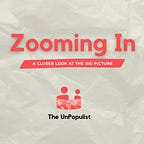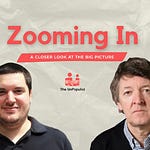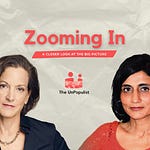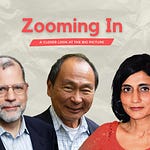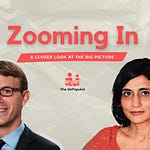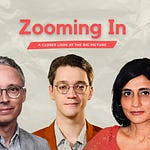Aaron Ross Powell: Welcome to Reactionary Minds, a project of The UnPopulist. I'm your host, Aaron Ross Powell. My guest today argues that a lot of America's social and economic problems, including the rise of populism and the affinity for authoritarian leaders, can be traced back to changing relationships and institutions in our neighborhoods. Dr. Seth D. Kaplan is a Professorial Lecturer in the Paul H. Nitze School of Advanced International Studies at Johns Hopkins University, Senior Advisor for the Institute for Integrated Transitions, visiting Fellow with Mercatus Center's Program on Pluralism and Civil Exchange, and consultant to organizations such as the World Bank, USAID, the State Department, and OECD. He's the author of the forthcoming Fragile Neighborhoods: Repairing American Society, One Zip Code at a Time.
Powell: What's wrong with America's neighborhoods?
Seth D. Kaplan: Think, if we went back 50, 60 years ago, you would know your neighbors, you would talk to them, you would have sustained relationships with them. You would be involved in personal relationships, you would be involved in, some might be informal, it might be formal, it might be the PTA, it might be some association, might just be a network of people that got together maybe around kids or around something to do with your spare time. We were embedded in relationships, we were embedded in institutions. Now, we have very little of that. Instead, we're on our phones, we're alone, we're isolated.
If we have a problem, we don't know who to call. We may not have anybody near us that we know well enough to depend upon. For me, when I talk about the problems of neighborhoods, I'm saying that because of the nature of how our relationships and institutions and neighborhoods have evolved, we're more isolated, we're more lonely, we're more vulnerable. We're more likely to be alienated from our surroundings, from institutions, and that feeds into a whole slew of other problems. Some social problems like suicide, deaths, or despair, but also larger political problems such as the rise of populism and polarization.
Powell: There's a lot there so let me ask some follow-up questions to unpack some of the things that you said. First, when you talk about increasing isolation, do you mean, I guess, physical in the sense that if I'm at home, and I'm interacting with hundreds of people online, or I have deep friendships, or I'm having Zoom happy hours with colleagues across the country, I am interacting with a lot of people. They're just not people who happen to live next door. Is there a meaningful distinction between those two?
Kaplan: In general, yes. Clearly, you could have a really good friend. My wife, her best friend is in San Diego. They haven't seen each other in at least 10 years, a few years more than that, I believe. They don't necessarily speak every day, but when they speak, they speak for hours. Whenever there's a problem, they call each other for long periods of time. That's a deep relationship. That relationship started in college, they spent many years together. It's much harder to create that relationship without the starting point being in person. What I'm talking about is a more general, there's a general phenomenon with, you look at the data, people are spending much less time not only with neighbors but simply with friends, with family, with other people.
Yes, they might be in meetings, but actually, they're less time with people. When you're in a meeting with 100 people, that's not much of an interpersonal relationship. You develop deep relationships because you spend a lot of time with people. You spend undivided time with people, you do things with people. That could be in your family, that could be on your street, that could be towards some goal. If you work with someone for 10 years, and it was just two or three of you, you might have a very good relationship around that. It wouldn't quite be the same because maybe somebody would fire you, and where would you be then?
But at least it would theoretically be a close relationship. Those types of Zoom meetings, those quantity large numbers of people virtual, you're not developing deep relationships. There's no institutions bringing you together, and so that's completely different.
Powell: That leads into my second question, which is, you've used the term "institutions," what do you mean by that?
Kaplan: Institutions can be many things. A marriage, a family is institution. A network, a neighborhood association is an institution. A church is an institution, a school is an institution. I live in a neighborhood that's full of institutions, so it could be last night, my oldest child's school had their annual dinner. There were over 500 people there. I didn't know many of them, but maybe I knew 50 people at the dinner. Most of them are my neighbors or nearby people. Most of them I see on a regular basis because they're in my neighborhood. My daughter plays with them, my wife walks down the street to the park and sees them.
We have the institution of the school. We also have a lot of informal institutions and networks, not quite institutions, that are bringing people together on a regular basis just to carpool back and forth. “Can you help me? Can I help you?”. That's not quite an institution, but there are some norms, and there are some things that are happening regularly that lead us to have recurring interactions with the same people which develops norms, which develops trust, which develops interdependency. That is something that more and more people in America are missing.
They don't have those relationships, they're not embedded in those institutions. They don't have that interdependency. Therefore, I would say what is affecting them, whether it's television or politics, or the rise of populist figures, it's a completely different influence on their lives. When you have a vacuum, things will fill the vacuum.
Powell: One final clarification question before we move on to the effects of all this. How evenly distributed are these problems? We hear a lot about, say, the hollowing out of rural communities, that they lose their churches and other institutions. That the jobs aren't there, that a lot of people move out of them. They seem to fit a lot of what you're describing. But on the other side, if you live in a dense city, you're exposed to a lot of people, you may interact with a lot of people. Is this more of a rural and suburban problem than an urban problem, or do we see it more uniformly distributed?
Kaplan: I think there's some argument that your distinction makes sense, but I would say that it's really hard to judge. I've been to rural areas with very thick institutions. I've been to some urban areas where they have very weak institutions, dysfunctional patterns. There might be a neighborhood. If you go to many American cities, the one being Washington that I think of the most, we have some of this in Washington. You go to Baltimore, and you walk around the city, the inequality, simply the great differences between a more materially well-off, social problems and material problems are not the same.
You can just walk around some of the neighborhoods and see the lack of supporting institutions, literally, in terms of people's lives. The families aren't stable, the schools aren't very successful. The networks in the neighborhood are not helping people find opportunity and help them when they're in trouble. If anything, they're working against that. We need to think beyond these types of categorizations. Certainly, one thing that matters is places in which there's a lot of religion. You can find some rural areas in which, for example, there's a few strong churches, and there's a long history, and the community is very strong.
You can go to eastern Kentucky where I went for a book I finished this year, and you can find there's devastation worse than you can find in any city. You have populations down by, I don't know, 30%, 40% within a relatively short period of time. You have a really awful situation, and part of it is the fact that they're in the rural area, and when there's problems and you're isolated, the problems, they cascade, and they're much harder to get your hands around. Believe me, I can find equally bad problems in cities.
Powell: Obviously, someone who is feeling isolated is not embedded in institutions, is unmoored from those cultural touchstones, can be personally fairly miserable. I can imagine that can cause problems for the people in their immediate lives as well, but what are the broader social and political implications of this?
Kaplan: Socially, the clearest I would say the politics. Let me talk about the politics second. For me, when you first look at this problem, you find that the United States has enormous spatial inequality. What I mean by that, I can mean that on a couple levels. First, you have about 800 or so distressed neighborhoods in cities.
Those are neighborhoods with very high levels of concentration of poverty. You have very few married families, you have very few models. You have very few people with any material wealth that are invested in those communities. Mostly, anyone that does well leaves, and every time they leave the neighborhood gets a little worse. Every program meant to help those people, those programs mostly encourage people, you get an opportunity you need to get out.
When we think about how to address those problems, we mostly try to help individuals and make the places worse. Certainly, the spatial inequality feeds into great disadvantage. It feeds into the fact that's now somewhat well-known, is that the social mobility is way down. If you're born poor, you're much more likely to stay poor than 50, 60 years ago. The single most important reason why that's true is that some zip codes, some neighborhoods, you simply have a great, great disadvantage compared to others. That feeds into anger, that feeds into lots of issues you can see in our society. Health, politics, social, and lots of money being spent that's not actually succeeding because those problems are intractable if you don't deal with the neighborhood effect.
In terms of the broader issue, the less we have relationships and institutions that we're involved with and committed to, I think the more we focus on politics, the more likely we're to focus on more authoritarian leaders. There are certainly studies, if you look at the rise of authoritarianism in the mid-20th century, one of the causes that's been identified by of quite a few scholars is that people had no attachments. They became alienated.
I think clearly, we see some of that in the United States, which explains why there's so much emphasis on politics, and there is a desire on the left and the right for, I would say, either very abstract policies without thinking through the impact on human beings and a great emphasis on individuals as saviors.
Powell: How does this compare to other countries? Obviously, all countries have seen a rise of smartphones, an addiction to that, and spending time online, and so on. We've seen Europe is much more secular than the United States, much lower church attendance. It's much more urbanized, its life is even more politically determined in a lot of ways. Do we see similar things or is this more of an American problem?
Kaplan: We see populism rising in many countries, and I'm sure that's something to do with the media. I'm sure it's something to do with the decline of community, the decline of relationships on a personal level. It's a global trend. I would say it's more likely to be worse in highly individualistic countries. A place like the United States, we're all spread out, we've designed our landscape in a way that's unlike almost any other place in the world. Just drive around the United States. You live in Colorado, you probably live in a relatively small area.
If there's a center of gravity around the town, and most people live around the town, conceivably, there are relationships that people will know each other, and there'll be some community. But if you live in most of America around cities, you get house after house after house. There may be no sidewalks, there may be no local shopping, you're going to drive to the highway or some shopping center. You have no way to know anybody around you. When we design a country, that's a country designed for isolation, that's a country designed to be socially impoverished.
There's a lot of things that we do. Up until World War II, every civilization in the world designed their physical landscape in a certain way that basically enriched people's lives socially. After World War II, the United States, in particular, you see some of this elsewhere, but I think we're the extreme example, is that we've designed a society for the individual, for the material. It maximizes autonomy, but that also maximizes isolation, maximizes social impoverishment. We even have zoning and all sorts of rules that make it impossible for you to have a cafe in your neighborhood, impossible to run any office except in your house.
It's incredible that you can walk streets after streets, and you can see nothing but houses. There's a term called third places. Not your office, not your home, a third place where you go meet people. We don't even have those. We even have, we send our kids to schools often not around where we live anymore. If you live in a suburb, I grew up in a suburb. We had a school district. That school district encouraged us to know our neighbors because of the way the district was designed. Often, today, we don't even do that. There's a lot of things we're doing in our society that isolate us, separate us, and I believe that feeds into some of the larger problems we're seeing.
Powell: The causes that you have set out seem like they fall into two categories. One is externally imposed restrictions in terms of zoning and other government policies that are making it more difficult for us to live in the kinds of neighborhoods that would be healthier in the ways that you have described. That is an issue where if we had more freedom to design neighborhoods the way that we want to, build them in these kind of ad hoc emergent ways, which is the way that these healthier European cities are, it would alleviate some of that.
On the other hand, you have causes that seem to be, this might be an unfair way to characterize it, but symptoms of liberalism. That our society is one that values self-authorship, self-expression, autonomy, personal choice, and so on, and that those things, I think that one of the phrases that you use in one of your essays is we have freedom from traditional constraints. Those seem to be problems of basically too much freedom or encouraging freedom on the individual level. The one from the perspective of The UnPopulist’s “We defend liberalism,” getting rid of zoning laws and other sorts of restrictions, “yay” we should definitely do that, but concerns about liberal autonomy seem potentially more troubling. Are you saying that we need to basically dial down cultural and social liberalism in order to have healthier communities?
Kaplan: I think if you look at de Tocqueville and you look at the founders of the United States, you'll see a clear preference for a strong society, strong social institutions, strong associations. They didn't necessarily have to be religion. Religion was one of the important ones. There's certainly a lot of data that says religious institutions are very important for developing the type of skills you need to be in a liberal society. I'm not sure the term "dial down" is quite correct. I think it's a question of liberalism depends on some pre-political values, pre-political social landscape.
I think the people who are great political philosophers from the 18th, 19th century, they understood that liberalism did not exist in isolation. Liberalism depended upon these pre-political, very socially determined dynamics. I would say, if anything, we have forgotten that. It's not a question of dialing down liberalism. It's a question of dialing up these other mechanisms. It's not something you can snap your finger and you can do. You have to think very hard about, how do you strengthen social institutions? How do you create a landscape that will encourage the development of social institutions?
Some of it is relatively simple. If you live in a cul-de-sac, what I used to call a dead-end street or a cul-de-sac, you probably know your neighbors more than if you live on a street next to a pretty busy road, and you're likely to—cul-de-sac, your kids roam, they know their neighbors. You live on a busy street. You want to keep your kids off the front yard, and you may not know anyone, and that's a landscape issue. School districts, the way we build our houses, there's a lot of things we can do as a society that will nurture strong social institutions, strong social relationships. I think we simply never had to do them.
We never had to do this. They were always there, and so we took them for granted. I would say in the last 50 or 60 years, we've done a lot of things that have weakened, damaged these social institutions. Even our civil society. Civil society used to be thick with social institutions. Now it's often professionally managed nonprofits. You send in the check, they advocate or they do things for people. It used to be we did things together in a personal relationship to help each other. Now we're doing things to those in need, or we're sending in a check, or advocating.
Just think about how different civil society is now for the way it was for the first 300 or so years of the American project if I go back to the 17th century. I don't think there's anything about dialing down liberalism. I just think we've forgotten the ingredients that are necessary for liberalism to flourish. The question is, what do we have to do to strengthen those, encourage those, nurture those? A lot of it isn't policy, but certainly, policy has to play a role. I would say our ambitions, the question is what is it in the culture that would encourage people to be ambitious in their neighborhood, in their locale, and not be simply their personal ambitions with politics? There's so much emphasis on politics, and I don't think politics is the source of our ills today at all.
Powell: I agree with that part entirely and have frequently made the argument that one of the real pathologies in our culture, in an increasingly politicized culture is that it tells us that if you want to make the world a better place, you do that via political mechanisms. That, you want to improve the lives of the people around you, run for office, or start a new government program, or so on. That people who attempt to affect positive change in non-state ways tend to be looked down on as kind of less committed to justice and improvement, and it routes resources away from healthier uses.
You said, look at the way that civil society looked 50, 60 years ago, and one big change that we have seen over the last 50, 60 years, and I'm curious if these are related, is a breaking down of traditional hierarchies along race, gender, ethnicity, religion lines and a radically growing social tolerance for lifestyles, and preferences, and identities that historically were very repressed and oppressed. It's, yes, there was a time when your local neighborhood was much stronger, the social ties were much stronger. You were much more likely to be involved in church and so on. You didn't leave your town.
But if you were, say, the gay kid in rural eastern Kentucky, or you were now the trans kid living in Texas, that was a pretty miserable setup for you. The ability to flee your town to the much more cosmopolitan city, and express yourself, and find people who maybe weren't the people in your geographic area, so maybe you're finding them online now, but you're finding people who share your values and identities, and so on, has been a huge positive, or the freeing up the ability of women to go out and have careers and so on.
Those are all good things, but those also all seem like things that cut against at least the way that the institutions you're describing used to exist.
Kaplan: Yes, I agree completely. Society's trade-offs and society is about balancing individual autonomy and balancing the greater needs of society. That's the constant tension. It's a natural tension. Society, to some degree, goes back and forth. If you went to the era in post-Civil War, you had a similar phenomenon in which you had an enormous emphasis on national politics over some decades. Then towards the end of the century, the 19th century, there was a turn much more to local, whether it's settlement houses or building local politics to get rid of corruption in your city.
There was a huge shift in emphasis in the culture, so it's not like we haven't been on this. American history, one of the great things is how long it is, and how much there's a consistent baseline in terms of the same institutions nationally, and you can see these shifts going back and forth. It's not like this is the first time we've had this dynamic, or we need to go through this experience, but in terms of what you said, for sure, in the last 50, 60 years, the freedoms, the opening up of society, many, many people have benefited.
It's clear that we're wealthier. There are segments of our population, some of which you've mentioned, have done much better. We have a lot more immigration than we had post-1965, a lot more immigrants, and our society is much more diverse in every way possible. For all of those reasons, there's people who were constrained before that have benefited, but what you see at the same time is, and this is less about groups now than about individuals, there are certain people who have thrived because of decay of these social institutions. They're able to create their networks.
They're able to create wealth and move to places they want to move to. Many, many individuals across all the groups in society, men, women, Black, White, Hispanic, gay, trans, straight, whatever it is, those who have been able to thrive, they've done incredibly well with the type of society we've created because the society is designed for those who are most able to make money, most able to climb up the type of social ladder that we have in our society to do well.
The downside of that, without the social structures, without the institutions, those that don't do as well, that might have been in the wrong place, or might not have got out of that place before it started doing badly, that might have been in coal country, might have been in some neighborhood in a city that went bad, that might have been in a part of the country where the factories went to Asia, and they didn't get out, or they weren't able to get out, or they had a parent— if you were in west Virginia or whatever, in east western Pennsylvania, you had a parent who couldn't move, didn't want to move. You lost your job, what were you going to do? Abandon your parent, or go in search of a job?
There's a lot of people like that because of the decay of the social structures, and the norms, and the parts of her country that suffered a lot. I can speak from personal experience, I have a brother-in-law who has never quite made it, and constantly having my wife try to take care of this person, and if this person was somehow embedded in stronger—they're immigrants, so they didn't grow up in a place in America where they were deeply embedded in institutions. They came, they were always very isolated, they have a problem with the language. Here's a person who struggles over and over and over again. Part of it is that there's not sufficient supporting structures, or they're not deeply embedded, and you have a lot of people like that. You have, I would think there's tens of millions of Americans who would do better if they had a stronger neighborhood, stronger social structure around them.
When I talk about this spatial inequality, which is a little bit of a different problem than the problem of populism, I'm talking about those millions and millions of people that, because of where they are, and what's going on in their neighborhood, they simply have a much less bright frontier and much less hope for the future, and a much worse present than those of us who live in nice suburbs, and we're comfortable with who we are, and we're well connected to our work.
That's a whole different problem that it gets actually very little attention. We talk about the rise of populism and the problems of our politics, we talk about poverty, but we don't really talk about these large segments of the country where people literally are trapped or are greatly disadvantaged simply of what street, what neighborhood they're in. It's a bit shocking to me coming from around the world where I travel, that you see so many people like that, and so little discussion of the problem.
Powell: I'm just speculating here, but could the problems that you describe be related to the rise and spread of not just populism but the conspiratorial thinking that goes along with it? I'm thinking of the significant rise of say, QAnon, which I think you could reframe as lonely and isolated people trying to find a way to feel like they are part of something that is bigger, that gives them a connection, that gives them a purpose, that gives them a mission that, "We are fighting back against these elites and conspiracies, and satanic cults, and I'm figuring out the hidden messages, which gives me a sense of accomplishment." Is there a relation between that kind of down-the-rabbit-hole conspiracy thinking and the loneliness and disconnection that you're describing?
Kaplan: Yes. I can't prove it. I haven't done a study to say who believes that versus what's their social, but let's go back. If you look at the data of the people who supported Trump early in his presidential run, there's plenty of data that shows that if you lived in counties or places with high social connectivity, you are less likely to support Trump than if you lived in places, counties in which there was low social connectivity. That's the best data I have to show you. The Mormons, for example, very reluctant to support Trump. Those are among the people that are most socially connected in terms of their local neighborhood or equivalent of a parish. Parish institutions is a little more than a neighborhood, depends on where you are, but they have very thick social connections, and they're very resistant, very resistant, to this type of populist person.
In terms of what you just said, I think we need to think of problems as upstream versus downstream. For me, if you are embedded in good relationships, you feel like your life has meaning, you feel like you have people that you support and are likely to support you. If those things are, these pre-political things, these things that are upstream, if those are all in place, you're much less likely to fall into poverty. You're much less likely to have suicide, you're much less likely to be low trust of the society. You're much less likely to be a supporter of conspiracy theories as you described. For me, all those things are related.
Those things are products of something that's going on in our society. Clearly, the change in media has some impact both as a cause to weaken our relationships and as a driver of these conspiracy theories, but I would say that if you had the strong social institutions in place, which must happen at the neighborhood level, you are going to be much more resistant to the problems you've described.
Powell: Then what are the mechanisms we have for fixing these problems, for rebuilding these institutions, and to do so in a way that doesn't reverse the progress that people who thrive in the new environment have had? Because we don't want to make things bad for gay and trans people, and women, and so on, and Blacks again, in order to fix it, obviously. Do we have ways to start building those institutions?
Kaplan: Yes. Broadly speaking, I don't think anything we have to do would have any impact on the population groups you've mentioned. Broadly speaking, I have two big buckets of things that we can do. One is what I would call the geography bucket. This is things like let's re-envision the landscape that is America. If we were to have a renewed push on neighborhoods and what that meant for our society if everybody lived in an identified neighborhood.
If you go to New York City, I'm from New York, you have some sense of your neighborhood, you have some sense of there's shopping in your neighborhood. That's unusual because that's an older city. It was designed around neighborhoods, and there's a few places like that. Imagine everywhere in America, we re-envisioned our whole landscape around neighborhoods. Imagine also that we decentralized government, at least some of governments, that neighborhoods had a say in how resources were spent, how their neighborhoods were shaped. Imagine that we had zoning and other government policies that were designed to strengthen neighborhoods so they were around commercial areas, they're around school districts, they were around places for people to meet.
Imagine that our government agencies did work too on housing, and healthcare, and education, and economic development, but they worked on how to help us live in better neighborhoods. Housing would be neighborhood revitalization. It wouldn't just be building low-income housing, it'd be building mixed-income neighborhoods or encouraging the development of mixed-income neighborhoods, so there would be no isolated poor people, which is what happens if you only build low-income housing in low-income neighborhoods. The point is, all of these institutions need to cooperate with some mechanism in the front line to gear them in towards improving our neighborhoods. That would be the geography bucket.
Second bucket is we ought to be doing things that encourage people to know each other, cooperate. These things are the third places I mentioned that could be everything from bars. Not that I go out and drink, but everything from bars to hair salons, to gyms, to coffee shops. We would encourage this to be in places where people get to know each other. Governments, you don't have to do huge things, but let's suppose there's some very good programs, for example, a program in Oswegatchie, New York. It basically gives small grants to blocks of neighbors who cooperate to improve their blocks.
You could be doing a lot of little things to encourage neighbors to know each other, cooperate to strengthen their blocks or strengthen their neighborhoods. There's a initiative in Edmonton where basically they try to organize the city. The city has a long history of neighborhoods, but they basically appoint volunteers. They find volunteers by neighborhood and even by a few streets each, and they have a city encouraged, there's a few government employees, but mostly volunteer-led program to develop a lot of social activity at the neighborhood level.
You go on and on developing, training people locally to play a leadership role. If you're in a poor neighborhood, finding ways to build up indigenous capital so that people don't have to leave to be wealthy. They can make money by doing, let's say housing or real estate development in the neighborhood. If you train people and you offered financing for people, people would make the neighborhoods more attractive, and they would invest in amenities because they wouldn't have to leave to have a better life. There's a lot of things we can do, I would call it geographic and social, that can strengthen neighborhoods.
Powell: Is this, to some extent, a call for density? The mixed-use neighborhoods tend to be denser neighborhoods versus just sprawled-out subdivisions tend to be denser. Because one of the things that we see a lot right now is many people fighting tooth and nail against, I think the very kinds of changes that you're asking for. The NIMBY movement is all about basically doing the opposite of everything you've just said.
Kaplan: Yes, it may not be against all of it, but it's certainly against—people are worried that they have assets, their property, and maybe the prices will go down, or they have a very fixed idea of how they should live. This is a democracy. We cannot tell people how they should live, but I would say in answer to your original question, this is certainly a call for more density. I don't think it's necessarily a call to get rid of suburbs. I live in a suburb, and we have very thick institutions. You can find suburbs, the most famous one in greater Washington, you go to Chevy Chase, and that's pretty suburban, but very thick social institutions.
You can go to some towns, it's not so dense, but there's a very rich set of local institutions and local connections and people involved with things. It is a call to design a country around mechanisms, structures, a landscape that will encourage people to spend more time with each other and to cooperate for mutual benefit and to discourage—I think we as people, human nature, we have a natural inclination to want more material and maybe to throw off our constraints, which can mean relationships. That may be our natural inclination, but it doesn't necessarily mean that that's what's in our best interest or what we would want if we were more embedded in relationships day in, day out.
I think these are things that are maybe natural to the human condition, but not necessarily how we have to be or what we should be because it's really not. There's no other time in human history where you can find the kind of isolation and separation and the kind of society that we've designed for ourselves here.
Powell: Let's take that back then to the question of polarization, which you've said is exacerbated by a lot of this, and the calls for authoritarianism, and the rise of populism, and so on. Because it seems like ultimately what you're calling for is a return, at least in part, of a much more robust social trust. That we should engage with our neighbors, and with people around us, and with people who are different from us, and trust each other in these institutionally affirming ways. Yet the polarization that we see, it dissolves social trust and discourages us from trusting each other, from wanting to be around each other, from wanting to help each other, from seeing each other as part of shared projects, and so on.
How do we accomplish the kinds of things you're asking for in an era where so many Americans don't just view each other as different, but as outright enemies and threats to each other's way of life, and ultimately just seem to hate each other?
Kaplan: First of all, I would say that part of our problem is that we spend no time with each other. If you went back again, we had all the problems you've identified but we were not only cross-political, we were cross-class in terms of how we lived. Now again the headline is that we're not spending time together across politics, but I would argue the bigger problem is we're not spending time across class. The class problem feeds into the political problem, and the class problem is, in my opinion, actually more intractable in many ways.
You literally have huge differences where you live in terms of your class and what that means for your future. Aaron, you've moved back to Colorado. You're one of at least 10 people, and I couldn't even give you a number, that in these couple of years have decided—I have a friend I just saw a couple of weeks ago at a conference, she moved back to Idaho. I have somebody else I know moved back to Southern Minnesota. Somebody else moved back to I think it's Iowa.
There seems to be people who are saying that they want to live in a smaller place. They want to live in a place where they know people, and they can contribute at a human size, and they can have relationships as part of their lives. Somebody like you, correct me if I'm wrong, but I don't think you're going to Colorado to be a hermit on the top of the mountain. Maybe that's part of the time, but you wanted to have a bigger house maybe, you wanted to have more nature in your life. You wanted to have a chance to do some sports or skiing, but you probably also wanted to have certain types of people around you that you can have in Colorado that you couldn't necessarily have easily—I don't think that was a choice you made because you wanted to get away from anyone's politics. Colorado is a somewhat diverse state politically, it depends upon what part of the state you're in. I don't know your part.
I think we can be angry at each other, but most of us, if you get us in the room with each other, or you get us on some event with each other, and especially if there's food—my primary job is bringing people together across the political spectrum to cooperate in many places around the world. That's what I do for a living. Nothing helps food, drink.
Not everybody drinks, of course. You just talk, and people are often from different backgrounds, but they get to know each other personally. Then everything else is manageable. I would say easily the biggest problem we have in our country is we're not spending enough time with each other, especially in institutions, informal, formal. Regular dinners is a kind of informal institution if you think about it. The thing is, yes, we're angry, but I think we need to get beyond the headline. It's clear that there's a small percentage of people on the left and the right, I don't know, 6%, 7%, you can look up the data, that are not going to get in the room with the other side. But there's about 85% or 80%, whatever number you want to put on it, that are not that angry.
They would be happy if the setting was right, if it was something that was regular, it was personal. I live in a neighborhood in which I know I can go down the two streets here and I can tell you who lives in every house on those streets. I can walk over three or four blocks, and I probably could tell you about three-quarters of the houses, who lives in them, what kids they have. This is the kind of neighborhood I live in. We almost never talk politics in my neighborhood. I don't even know for the most part, what their politics is.
I could make some guesses. Depends upon what school, that we don't all go to the same school and whatnot. I could make some guesses, but for the most part, I don't actually know, but I know them as human beings. I know if my child has a problem where I might go, where the nurses are. If you have kids, you know where the nurses are, where is the potential kids that might babysit. We had a babysitter last night, and so on and so forth. Those are the things that seem to matter. I would say if our society offered these opportunities, if it was designed to encourage these opportunities, the politics would become less important.
© The UnPopulist, 2023
Follow us on Bluesky, Threads, YouTube, TikTok, Facebook, Instagram, and X.
We welcome your reactions and replies. Please adhere to our comments policy.


